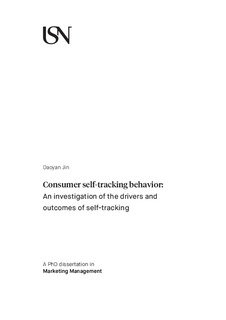Consumer self-tracking behavior: An investigation of the drivers and outcomes of self-tracking
Doctoral thesis
Published version
Permanent lenke
http://hdl.handle.net/11250/2629994Utgivelsesdato
2019Metadata
Vis full innførselSamlinger
- Marketing management [10]
Sammendrag
Despite the increasing popularity of self-tracking technologies in the market (e.g., activity tracking devices and apps), consumer adoption of these technologies continues to be a challenge, and there exists concerns about the benefits of using such technologies. The current dissertation investigates the likely drivers, as well as the outcomes, of consumer self-tracking behavior in order to provide a comprehensive understanding of the phenomenon. Therefore, the current dissertation examines two main research questions: (1) What factors influence consumer adoption or use of selftracking technologies, and how? (2) How do self-tracking technologies influence various consumer outcomes (e.g., motivation, experience, and well-being), and what are the roles of individual (e.g., types of consumers) and contextual (e.g., types of activities) factors?
The current dissertation is comprised of three separate papers. Paper 1 undertakes a systematic review of the extant literature on self-tracking behavior, specifically in the context of fitness tracking, to explore the current state of knowledge on the drivers and outcomes of self-tracking behavior. Based on the review, paper 1 identifies 18 drivers of fitness-tracking technology adoption (e.g., age, technology affinity, data quality, and perceived device value etc.) and reveals four main outcomes of fitness tracking (e.g., task motivation, task experience, physical activity level, and well-being/health). Paper 2 examines a situational factor (i.e., incidental curiosity) that can facilitate consumer selftracking behavior and explains the causal mechanism. Three experiments demonstrate that incidentally induced curiosity enhances consumers’ perceived value of curiosityrelevant unknown information (e.g., answer to a puzzle). This positive perception in turn spills over to other curiosity-irrelevant unknown information—increases perceived value of curiosity-irrelevant unknown information (e.g., unknown self-related information). As a result, incidental curiosity increases consumers’ intention to use selftracking technologies. Paper 3 explores the effect of self-tracking on consumer experience (i.e., enjoyment, subjective vitality) by considering the role of both individual and contextual factors. Three experiments demonstrate that, for effortful tasks, self-tracking has contrasting effects on the task experience of different consumer segments: i.e., a positive effect on the females versus a negative effect on the males. This is due to females’ (vs. males’) tendency to underestimate (vs. overestimate) themselves. As selftracking feedback can help females realize that they are more capable than they previously thought, self-tracking increases females’ (vs. males’) perceived competence, which in turn increases females’ (vs. males’) task experience. The findings of the current dissertation provide important insights for both consumer researchers and marketing practitioners.
Består av
Paper 1: Consumer self-tracking behavior in physical activity: an integrative review of drivers and outcomes of fitness tracking (under review at Sensors)Paper 2: Incidental curiosity and consumer intention to obtain unknown information: Implications for new product adoption and self-tracking behavior (under review at Journal of Consumer Psychology)
Paper 3: Self-tracking effortful tasks: gender differences in consumer experience (under review at Journal of Consumer Behavior)

